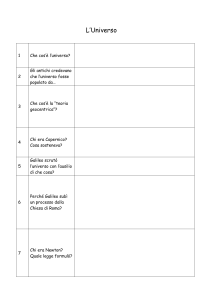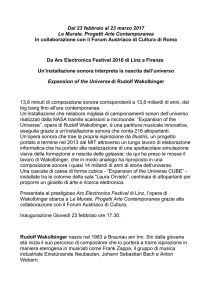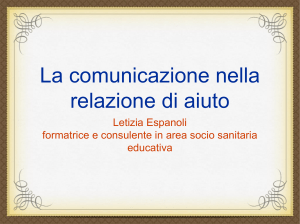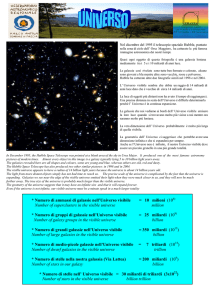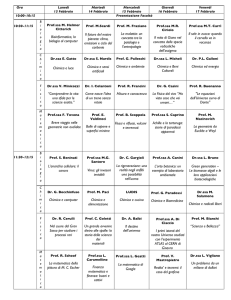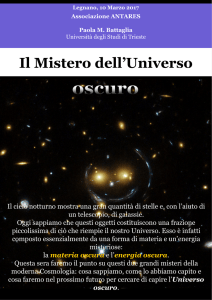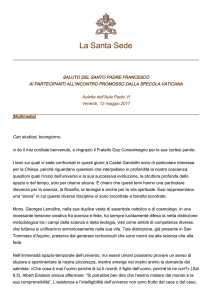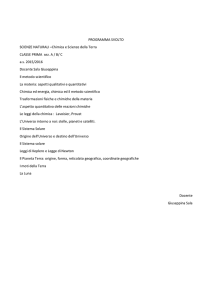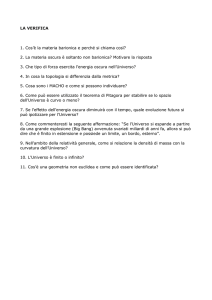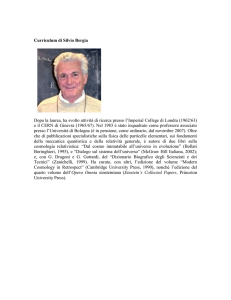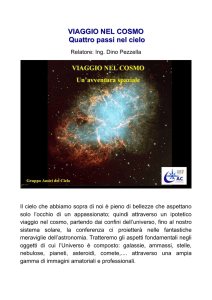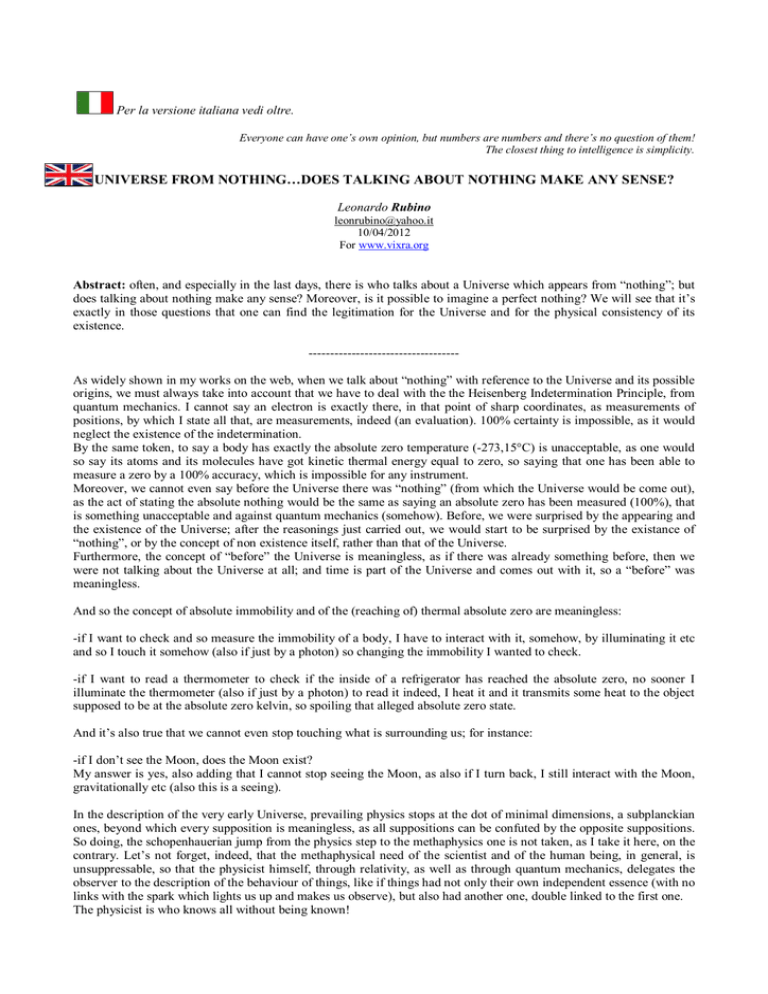
Per la versione italiana vedi oltre.
Everyone can have one’s own opinion, but numbers are numbers and there’s no question of them!
The closest thing to intelligence is simplicity.
UNIVERSE FROM NOTHING…DOES TALKING ABOUT NOTHING MAKE ANY SENSE?
Leonardo Rubino
[email protected]
10/04/2012
For www.vixra.org
Abstract: often, and especially in the last days, there is who talks about a Universe which appears from “nothing”; but
does talking about nothing make any sense? Moreover, is it possible to imagine a perfect nothing? We will see that it’s
exactly in those questions that one can find the legitimation for the Universe and for the physical consistency of its
existence.
----------------------------------As widely shown in my works on the web, when we talk about “nothing” with reference to the Universe and its possible
origins, we must always take into account that we have to deal with the the Heisenberg Indetermination Principle, from
quantum mechanics. I cannot say an electron is exactly there, in that point of sharp coordinates, as measurements of
positions, by which I state all that, are measurements, indeed (an evaluation). 100% certainty is impossible, as it would
neglect the existence of the indetermination.
By the same token, to say a body has exactly the absolute zero temperature (-273,15°C) is unacceptable, as one would
so say its atoms and its molecules have got kinetic thermal energy equal to zero, so saying that one has been able to
measure a zero by a 100% accuracy, which is impossible for any instrument.
Moreover, we cannot even say before the Universe there was “nothing” (from which the Universe would be come out),
as the act of stating the absolute nothing would be the same as saying an absolute zero has been measured (100%), that
is something unacceptable and against quantum mechanics (somehow). Before, we were surprised by the appearing and
the existence of the Universe; after the reasonings just carried out, we would start to be surprised by the existance of
“nothing”, or by the concept of non existence itself, rather than that of the Universe.
Furthermore, the concept of “before” the Universe is meaningless, as if there was already something before, then we
were not talking about the Universe at all; and time is part of the Universe and comes out with it, so a “before” was
meaningless.
And so the concept of absolute immobility and of the (reaching of) thermal absolute zero are meaningless:
-if I want to check and so measure the immobility of a body, I have to interact with it, somehow, by illuminating it etc
and so I touch it somehow (also if just by a photon) so changing the immobility I wanted to check.
-if I want to read a thermometer to check if the inside of a refrigerator has reached the absolute zero, no sooner I
illuminate the thermometer (also if just by a photon) to read it indeed, I heat it and it transmits some heat to the object
supposed to be at the absolute zero kelvin, so spoiling that alleged absolute zero state.
And it’s also true that we cannot even stop touching what is surrounding us; for instance:
-if I don’t see the Moon, does the Moon exist?
My answer is yes, also adding that I cannot stop seeing the Moon, as also if I turn back, I still interact with the Moon,
gravitationally etc (also this is a seeing).
In the description of the very early Universe, prevailing physics stops at the dot of minimal dimensions, a subplanckian
ones, beyond which every supposition is meaningless, as all suppositions can be confuted by the opposite suppositions.
So doing, the schopenhauerian jump from the physics step to the methaphysics one is not taken, as I take it here, on the
contrary. Let’s not forget, indeed, that the methaphysical need of the scientist and of the human being, in general, is
unsuppressable, so that the physicist himself, through relativity, as well as through quantum mechanics, delegates the
observer to the description of the behaviour of things, like if things had not only their own independent essence (with no
links with the spark which lights us up and makes us observe), but also had another one, double linked to the first one.
The physicist is who knows all without being known!
If now we go back to the appearing of the Universe, through the appearing of particles and antiparticles (+ and -), a
particle-antiparticle pair, which corresponds to an energy ΔE, is legitimated to appear anyhow, unless it lasts less than
Δt, in such a way that ∆E ⋅ ∆t ≤ h 2 (extrapolated from the Heisenberg Indetermination Principle); in other words, it
can appear provided that the observer doesn’t have enough time, in comparison to his means of measure, to figure it out,
so coming to the ascertainment of a violation of the Principle of Conservation of Energy, according to which nothing
can be eather created or destroyed.
In fact, the Universe seems to vanish towards a singularity, after its collapsing, or taking place from nothing, during its
inverse Big Bang-like process, and so doing, it would be a violation of such a conservation principle, if not supported
by the above Indetermination Principle.
The appearing of a pair (+ and -) corresponds to the expansion of a small spring, while the approaching, one another, of
the particles (+ and -), which is the annihilation, corresponds to the contraction and releasing of the small spring.
The appearing and the annihilation, on a small scale, correspond to the expansion and contraction of the Universe, on a
large scale.
And according to my previous works, published on the web, I proved that the atomic systems, made of particles + and -,
and also the gravitational ones (such as the Universe) respect the Hooke’s Law, as chance would have it, so they behave
as springs!
Therefore, in my opinion, the Universe is a big oscillating spring, between a Big Bang and a Big Crunch. Someone
wonders if the next Big Bang creates again an identical Universe (and so if we will be as well as we are now), but also
if that were true, nobody could verify that, as with the Big Crunch every memory and every possibility of memory and
of verification would be destroyed; so, we can only talk about one Universe, this one, here and now.
Then, if now we were in an expanding Universe, we wouldn’t have any gravitational force, or it were opposite to how it
is now, and it’s not true that just the electric force can be repulsive, but the gravitational force, too, can be so (in an
expanding Universe); now it’s not so, but it was!
The most immediate philosophical consideration which could be made, in such a scenario, is that, how to say, anything
can be born (can appear), provided that it dies, and quick enough; so the violation is avoided, or better, it’s not
proved/provable, and the Principle of Conservation of Energy is so preserved, and the contradiction due to the
appearing of energy from nothing is gone around, or better, it is contradicting itself.
Thank you.
Leonardo RUBINO.
Bibliography:
1) (L. Rubino) http://vixra.org/pdf/1112.0087v1.pdf
2) (L. Rubino) http://vixra.org/pdf/1112.0085v1.pdf
3) (L. Rubino) http://vixra.org/pdf/1112.0082v1.pdf
--------------------------------------------------------------
Ognuno può avere la propria opinione, ma i numeri sono numeri e non si discutono!
La cosa più vicina all’intelligenza è la semplicità.
UNIVERSO DAL NULLA…MA HA SENSO PARLARE DI NULLA?
Leonardo Rubino
[email protected]
10/04/2012
Per www.vixra.org
Abstract: spesso, e soprattutto ultimamente, si parla di un Universo che si origina dal nulla; ma ha senso parlare di
nulla? Ed è possibile immaginare un perfetto nulla? Vedremo che è proprio in tali quesiti che troverà legittimazione
l’Universo e la coerenza fisica della sua esistenza.
----------------------------------Come già ampiamente esposto in vari miei lavori presenti in rete, quando, nel riferirsi all’Universo ed alle sue possibili
origini, si parla di “nulla”, bisogna ricordarsi che bisogna sempre fare i conti con il Principio di Indeterminazione di
Heisenberg della meccanica quantistica. Io non posso dire che un elettrone si trova esattamente lì, in quel punto di
precise coordinate, in quanto la misura di posizione, tramite la quale io poi affermo ciò, è appunto una misura, ossia una
valutazione. La certezza al 100% è impossibile, in quanto escluderebbe l’esistenza dell’indeterminazione.
E così, anche l’affermare che un corpo si trovi esattamente alla temperatura dello zero assoluto (-273,15°C) è
inaccettabile, in quanto si affermerebbe che i suoi atomi e le sue molecole hanno energia cinetica termica pari
esattamente a zero, affermando così di aver potuto misurare uno zero con la precisione del 100%, precisione che
palesemente manca, però, a qualsiasi strumento di misura.
Dunque, non posso nemmeno affermare che prima dell’Universo ci fosse il nulla (da cui esso sarebbe poi scaturito), in
quanto l’affermare il nulla assoluto significherebbe affermare una misura di uno “zero” assoluto (al 100%), ossia non
reale e non accettabile e contrario, in qualche modo, alla meccanica quantistica. Prima ci pareva strana la comparsa e
l’esistenza dell’Universo; dopo tali ragionamenti, dovrebbe iniziare ad apparire strana ed indimostrabile l’esistenza del
“nulla”, o lo stesso concetto di non esistenza, più che di quello di Universo..
Senza contare che il concetto di “prima” dell’Universo è privo di senso, in quanto se c’era qualcosa già prima, allora
evidentemente non stavamo parlando dell’Universo; ed il tempo è parte dell’Universo e nasce con esso, dunque non vi
poteva essere un prima.
E così anche i concetti di immobilità assoluta e di (raggiungibilità dello) zero assoluto termico perdono di significato:
-se mi propongo di verificare e, dunque, di misurare l'immobilità di un corpo, devo, in qualche modo, interagire con
esso, illuminandolo ecc e, dunque, lo tocco, in qualche modo (anche se solo con un fotone), mutando l'immobilità che
mi proponevo di verificare.
-se volessi leggere su un termometro se l'interno di un frigorifero è giunto allo zero assoluto, appena illumino il
termometro (foss'anche con un solo fotone), per leggerlo, lo scaldo e lo stesso trasmette calore all'oggetto presunto a
zero kelvin, vanificando quello stato presunto di zero assoluto.
Ed è poi vero pure il fatto che non posso nemmeno rinunciare a toccare ciò che mi circonda; ad esempio:
-se non guardo la Luna, la Luna esiste?
La mia risposta è sì, corredata dalla osservazione secondo cui io non posso di fatto smettere di guardare la Luna, in
quanto, anche se girato di schiena, interagisco forzatamente con essa a livello gravitazionale ecc (è un guardarla anche
quello).
Nella descrizione del very early Universe, la fisica prevalente si ferma al puntino di dimensioni minime, di dimensioni
subplanckiane, oltre il quale non ha più senso teorizzare nulla, in quanto tutte le ipotesi potrebbero essere confutate
dalle ipotesi contrarie. In tal modo, non viene compiuto quel salto schopenhaueriano, dal gradino della fisica a quello
della metafisica, che, invece, io qui compio. Non dimentichiamo, infatti, che il bisogno metafisico dello scienziato e
dell’uomo, in generale, è insopprimibile, tanto che lo stesso fisico, sia con la relatività che con la meccanica quantistica,
delega l'osservatore alla descrizione del comportamento delle cose, come se, appunto, le cose non avessero solo
un'essenza propria indipendente da noi e dalla scintilla che ci anima e che ci fa osservare, ma bensì ne avessero anche
un'altra, legata a doppio filo con la prima.
Il fisico è il soggetto che tutto conosce, senza essere conosciuto!
Tornando alla comparsa dell’Universo, tramite la comparsa di particelle ed antiparticelle (+ e -), una coppia particellaantiparticella, cui corrisponde una energia ΔE, è legittimata a comparire, purchè sia di durata inferiore a Δt, nella misura
in cui ∆E ⋅ ∆t ≤ h 2 (estrapolazione dal Principio di Indeterminazione di Heisenberg), cioè, essa può comparire a
patto che l’osservatore non abbia tempo sufficiente, in relazione ai suoi mezzi di misura, per determinarla, giungendo
quindi alla constatazione della violazione del Principio di Conservazione dell’Energia, secondo cui nulla si crea e nulla
si distrugge. Infatti, l’Universo, che nella sua fase di contrazione massima verso una singolarità, pare svanire nel nulla
(Big Crunch), o originarsi dal nulla, nel processo inverso a mo’ di Big Bang, rappresenterebbe una violazione di tale
principio di conservazione, se non fosse per il Principio di Indeterminazione di cui sopra.
Il comparire di una coppia particella-antiparticella è assimilabile all’espandersi di una piccola molla, mentre il
successivo eventuale riavvicinamento delle particelle della coppia, con conseguente annichilazione, è un ricontrarsi e
scaricarsi della mollettina.
La comparsa e l’annichilazione, in piccolo, equivalgono alla espansione e contrazione dell’Universo, in grande.
E dai miei precedenti lavori, pubblicati in rete, è data dimostrazione del fatto che, guarda caso, sia i sistemi atomici,
composti da particelle + e -, che quelli gravitazionali (ad esempio, l’Universo) seguono inequivocabilmente la Legge di
Hooke, ossia si comportano come delle molle!
L’Universo è dunque, a mio avviso, una grossa molla che oscilla, tra un Big Bang e un Bib Crunch. C’è chi si chiede se
il Big Bang successivo ricrei un Universo identico a quello precedente (e se dunque noi rinasceremo identici ecc), ma
anche se fosse, ciò non sarebbe verificabile, in quanto col Big Crunch verrebbe distrutta ogni memoria ed ogni
possibilità di memoria e di verifica di ciò e, dunque, si può solo parlare, in ultima analisi, di un solo Universo, questo,
qui ed ora.
Se poi ora fossimo in un Universo in fase di espansione, la gravità non esisterebbe, anzi esisterebbe all’incontrario, e
non è dunque vero che solo la forza elettrica può essere repulsiva, ma anche la gravità può esserlo (con Universo in fase
di espansione); ora non lo è, ma lo fu!
La considerazione filosofica più immediata che si può fare, in tale scenario, è che, come dire, tutto può nascere
(comparire), purchè muoia, e sufficientemente in fretta; e così la violazione è evitata, o meglio, non è
dimostrata/dimostrabile, ed il Principio di Conservazione dell’Energia è preservato, e la contraddizione della comparsa
di energia dal nulla è aggirata, anzi, di più, è contraddetta essa stessa.
Grazie per l’interesse mostrato.
Leonardo RUBINO.
Bibliografia:
1) (L. Rubino) http://vixra.org/pdf/1112.0087v1.pdf
2) (L. Rubino) http://vixra.org/pdf/1112.0085v1.pdf
3) (L. Rubino) http://vixra.org/pdf/1112.0082v1.pdf
--------------------------------------------------------------

